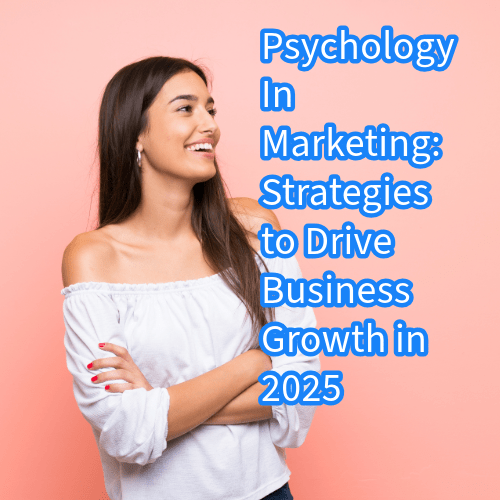
Marketing is an ever-evolving field, with new technologies and trends reshaping how businesses communicate with customers. Yet, one factor remains constant: the importance of understanding human behavior.
By leveraging psychology in marketing, companies can create compelling strategies that resonate with their audience on a deeper level, ultimately driving growth.
In 2025, as competition intensifies and customer expectations evolve, tapping into psychological insights will be more critical than ever.
Discover the role of psychology in marketing and strategies to drive business success in 2025.
Psychology In Marketing: Strategies to Drive Business Growth in 2025

The Role of Psychology in Marketing
Psychology in marketing studies how people think, feel, and behave about products, services, and brands.
By understanding the psychological drivers behind consumer decisions, businesses can tailor their marketing efforts to meet their audience’s needs and desires.
From how colors influence emotions to the impact of social proof on decision-making, psychological principles offer powerful tools to enhance marketing effectiveness.

In 2025, advancements in data analytics and artificial intelligence (AI) will provide unprecedented opportunities to apply psychological principles at scale.
Marketers can analyze customer behavior in real time, personalize interactions, and predict future actions with remarkable accuracy.
However, leveraging these tools requires a solid understanding of the psychological factors that drive consumer behavior.
Psychological Principles in Marketing

- Social Proof
Social proof is the tendency for people to follow the actions of others, especially in uncertain situations. Reviews, testimonials, and user-generated content (UGC) are examples of social proof that can build trust and credibility.
In 2025, social media platforms and influencer marketing will continue to amplify the impact of social proof.
Strategy
Encourage customers to leave reviews and share their experiences on social media. Collaborate with micro-influencers who align with your brand to reach niche audiences authentically.
- Scarcity and Urgency
The scarcity principle states that people place a higher value on items that are perceived as limited in availability. Similarly, creating a sense of urgency can prompt immediate action.
Strategy:
To create urgency, use time-limited offers, low-stock alerts, and countdown timers. Ensure these tactics are genuine to maintain trust.

- Reciprocity
Reciprocity is the instinctive desire to return a favor. Offering something valuable for free, such as content, samples, or discounts, can foster goodwill and encourage future purchases.
Strategy:
Provide free resources like eBooks, webinars, or trials. Ensure these offerings genuinely solve a problem or add value for your audience.
- Anchoring
The anchoring effect refers to the tendency to rely heavily on the first piece of information encountered when making decisions. This principle is often used in pricing strategies.

Strategy:
Present the most expensive option first to make other options seem more affordable. Alternatively, highlight a discount by showing the original price alongside the sale price.
- Emotional Appeals
Emotion plays a significant role in decision-making. Campaigns that evoke emotions like happiness, fear, or nostalgia can leave a lasting impact.
Strategy
Craft storytelling campaigns that resonate with your audience’s values and emotions. Use visuals, music, and narratives to create an emotional connection.
Strategies to Drive Business Growth Using Psychology
As businesses navigate the complexities of 2025, applying psychological principles effectively requires a combination of creativity, data-driven insights, and ethical considerations. Here are key strategies to consider:

- Personalization at Scale
Consumers increasingly expect personalized experiences. AI and machine learning enable businesses to deliver tailored content, product recommendations and offers based on individual preferences and behavior.
Tips
Use customer segmentation to identify distinct groups within your audience.
Leverage behavioral data to send personalized emails and advertisements.
Implement dynamic website content that adapts to user behavior in real time.
- Harnessing the Power of Neuromarketing
Neuromarketing involves studying the brain’s responses to marketing stimuli to understand what drives decision-making. Techniques such as eye tracking, facial expression analysis, and biometric measurements can provide valuable insights.

Tips
Test ad layouts, colors, and messaging using neuromarketing tools to identify what resonates most with your audience.
Focus on optimizing the emotional and sensory appeal of your campaigns.
- Leveraging Behavioral Triggers
Behavioral triggers are cues that prompt specific actions. For example, sending an abandoned cart email can encourage customers to complete their purchases.
Tips
Set up automated triggers for key moments in the customer journey, such as post-purchase follow-ups or birthday discounts.
Use gamification to incentivize desired behaviors, such as reward programs or achievement badges.

- Building Community and Connection
Humans are social creatures who crave connection. Creating a sense of community around your brand can foster loyalty and advocacy.
Tips
Develop online communities through social media groups or brand forums.
Host virtual or in-person events that bring customers together.
Highlight user stories and testimonials to showcase your brand’s impact.
- Ethical Marketing Practices
While psychological principles are powerful, using them responsibly is essential. Misleading tactics can damage trust and harm your brand in the long term.

Tips
Be transparent about your intentions and practices.
Avoid exploiting vulnerabilities or creating unnecessary fear.
Focus on providing genuine value and fostering long-term relationships.
Emerging Trends in Psychology-Driven Marketing
The landscape of marketing is constantly evolving, and 2025 will bring new trends that capitalize on psychological insights:

- AI-Driven Emotional Analysis
AI tools are becoming increasingly adept at analyzing emotions through text, voice, and facial expressions. Marketers can use this data to fine-tune campaigns and create more empathetic interactions.
- Immersive Experiences
With advancements in virtual reality (VR) and augmented reality (AR), brands can create immersive experiences that engage multiple senses. These technologies tap into the psychology of presence and make interactions more memorable.

- Sustainability and Purpose-Driven Marketing
Consumers are increasingly drawn to brands that align with their values. Highlighting your commitment to sustainability, diversity, and social responsibility can create emotional connections and drive loyalty.
- Hyper-Personalized Content
As AI algorithms become more sophisticated, hyper-personalization will move beyond product recommendations to include tailored storytelling, interactive content, and real-time adaptations.
- Cross-Channel Consistency

Maintaining a consistent brand voice and experience across multiple channels is crucial. Customers expect seamless interactions, whether they’re browsing a website, using a mobile app, or visiting a physical store.
In 2025, the intersection of psychology and marketing offers businesses a unique opportunity to connect with their audience on a deeper level.
By understanding and applying psychological principles, companies can create compelling, customer-centric strategies that drive growth.
However, success requires a balance of innovation, data-driven insights, and ethical practices.

Knowing the latest trends and consumer behaviors will be essential for sustained success.
Use these psychology marketing strategies to drive your business growth and success in 2025.
AI Tools for You
https://www.bestprofitsonline.com/myblog/newai
Tip
How To Improve Your Social Media Marketing
